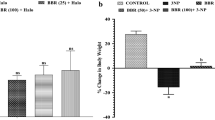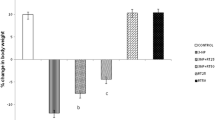Abstract
Tardive dyskinesia (TD) is associated with the use of antipsychotic drugs such as D2 antagonist haloperidol (HP). The chronic use of HP is involved in the causation of free radicals and/or oxidative stress. In view of the nootropic, anti-anxiety, anti-inflammatory-like effects of rice bran oil (RBO) in a variety of investigations, we assessed the protective properties of RBO on HP-induced TD and neurochemical alteration. Rats treated with HP orally at a dose of 0.2 mg/kg/day for a period of 5 weeks developed VCMs which increased progressively as the treatment continued for 5 weeks. Co-administration of RBO by oral tubes at a dose of 0.4 ml/day prevented the induction of HP-induced VCMs. Repeated administration of HP increases the turnover of dopamine metabolism in the striatum. Conversely animals treated with HP + RBO decrease the metabolism of DA than water + HP treated animals. Striatal, malondieldehyde (MDA), hydrogen peroxide (H2O2) and antioxidant enzyme superoxide dismutase (SOD), catalase (CAT) and glutathione peroxidase (GPx) were also determined. It is suggested that beneficial role of RBO in attenuation of HP-induced TD. The results therefore recommended that supplementation of RBO may be useful in the HP-induced TD. The findings have also potential implication in the treatment of schizophrenia and motor disorders.







Similar content being viewed by others
References
Abdalla DS, Monteiro HP, Oliveira JA, Bechara EJ (1986) Activities of superoxide dismutase and glutathione peroxidase in schizophrenic and manic-depressive patients. Clin Chem 32:805–807
An HM, Tan YL, Shi J, Wang ZR, Li J, Wang YC, Lv MH, Zhou DF, Soares JC, Kosten TR, Yang FD, Zhang XY (2016) Beneficial effects of EGb761 and vitamin E on haloperidol-induced vacuous chewing movements in rats: possible involvement of S100B mechanisms. Behav Brain Res 297:124–130
Araujo SM, de Paula MT, Poetini MR, Meichtry L, Bortolotto VC, Zarzecki MS, Jesse CR, Prigol M (2015) Effectiveness of γ-oryzanol in reducing neuromotor deficits, dopamine depletion and oxidative stress in a Drosophila melanogaster model of Parkinson’s disease induced by rotenone. Neurotoxicology 51:96–105
Arnaiz SL, Coronel MF, Boveris A (1999) Nitric oxide, superoxide, and hydrogen peroxide production in brain mitochondria after haloperidol treatment. Nitric Oxide 3:235–243
Balijepalli S, Kenchappa RS, Boyd MR, Ravindranath V (2001) Protein thiol oxidation by haloperidol results in inhibition of mitochondrial complex I in brain regions: comparison with atypical antipsychotics. Neurochem Int 38:425–435
Bishnoi M, Chopra K, Kulkarni SK (2007) Possible anti-oxidant and neuroprotective mechanisms of zolpidem in attenuating typical anti-psychotic-induced orofacial dyskinesia: a biochemical and neurochemical study. Prog Neuro-Psychopharmacol Biol Psychiatry 31:1130–1138
Blake DR, Allen RE, Lunec J (1987) Free radicals in biological systems--a review orientated to inflammatory processes. Br Med Bull 43:371–385
Bouayed J, Rammal H, Soulimani R (2009) Oxidative stress and anxiety: relationship and cellular pathways. Oxidative Med Cell Longev 2:63–67
Burger ME, Alves A, Callegari L, Athayde FR, Nogueira CW, Zeni G, Rocha JB (2003) Ebselen attenuates reserpine-induced orofacial dyskinesia and oxidative stress in rat striatum. Prog Neuro-Psychopharmacol Biol Psychiatry 27:135–140
Datta S, Jamwal S, Deshmukh R, Kumar P (2016) Beneficial effects of lycopene against haloperidol induced orofacial dyskinesia in rats: possible neurotransmitters and neuroinflammation modulation. Eur J Pharmacol 771:229–235
El-awdan S, Abdel Jaleel G, Saleh D (2015) Alleviation of haloperidol induced oxidative stress in rats: effects of sucrose vs grape seed extract. Bulletin Fac Pharmacy Cairo University 53:29–35
Elkashef AM, Wyatt RJ (1999) Tardive dyskinesia: possible involvement of free radicals and treatment with vitamin E. Schizophr Bull 25:731–740
Flohé L, Günzler WA (1984) Assays of glutathione peroxidase. Methods Enzymol 105:114–121
Fontella FU, Siqueira IR, Vasconcellos AP, Tabajara AS, Netto CA, Dalmaz C (2005) Repeated restraint stress induces oxidative damage in rat hippocampus. Neurochem Res 30:105–111
Govindarajan S, Vellingiri K (2016) Effect of red yeast rice and coconut, rice branor sunflower oil combination in rats on hypercholesterolemic diet. J Clin Diagn Res 10:5–7
Grover S, Kumar P, Singh K, Vikram V, Budhiraja RD (2013) Possible beneficial effect of peroxisome proliferator-activated receptor (PPAR)--α and γ agonist against a rat model of oral dyskinesia. Pharmacol Biochem Behav 11:17–23
Gupta YK, Gupta M, Kohli K (2003) Neuroprotective role of melatonin in oxidative stress vulnerable brain. Indian J Physiol Pharmacol 47:373–386
Haleem DJ, Khan NH (2003) Enhancement of serotonin-1A receptor dependent responses following withdrawal of haloperidol in rats. Prog Neuro-Psychopharmacol Biol Psychiatry 27:645–651
Haleem DJ, Parveen T (1994) Brain regional serotonin synthesis following adaptation to repeated restraint. Neuroreport 5:1785–1788
Haleem DJ, Samad N, Haleem MA (2007) Reversal of haloperidol-induced tardive vacuous chewing movements and supersensitive somatodendritic serotonergic response by buspirone in rats. Pharmacol Biochem Behav 87:115–121
Haleem DJ, Shireen E, Haleem MA (2004) Somatodendritic and postsynaptic serotonin-1A receptors in the attenuation of haloperidol-induced catalepsy. Prog Neuro-Psychopharmacol Biol Psychiatry 28:1323–1329
Howland RH (2011) Drug therapies for tardive dyskinesia: part 2. J Psychosoc Nurs Ment Health Serv 49:17–20
Klein PC, Cintra RM, Binda N, Diniz MD, Gomez VM, Souto AA, de Souza HA (2016) Co-administration of reserveratol and rice oil mitigates nociception and oxidative state in a mouse fibromyalgia-like model. Pain Res Treatment 3191638
Kumar A, Garg R (2009) Possible role of trazodone and imipramine in sleep deprivation-induced anxiety-like behavior and oxidative damage in mice. Method Find Exp Clin Pharmacol 31:383–387
Livingstone DR, O’hara SCM, Frettsome F, Rundle J (2001) Contaminant-mediated pro−/anti-oxidant processes and oxidative damage in early life-stages of fish. In Environment and animal Development. Genes, Life Histories and Plasticity. pp 173–201
Lohr JB (1991) Oxygen radicals and neuropsychiatric illness. Some speculations. Arch Gen Psychiatry 48:1097–1106
Lysko PG, Lysko KA, Yue TL, Webb CL, Gu JL, Feuerstein G (1992) Neuroprotective effects of carvedilol, a new antihypertensive agent, in cultured rat cerebellar neurons and in gerbil global brain ischemia. Stroke 23:1630–1635
Mahadik SP, Mukherjee S (1996) Free radical pathology and antioxidant defense in schizophrenia: a review. Schizophr Res 19:1–17
Murthy CKN, Jayaprakasha GK, Singh RP (2002) Studies on antioxidant activity of pomegranate (Punica granatum) peel extract using in vivo models. J Agric Food Chem 50:4791–4795
Newcomer JW (2007) Metabolic considerations in the use of antipsychoticmedications: a review of recent evidence. J Clin Psychiatry 1:20–27
Nikolaus S, Hautzel H, Müller HW (2014) Neurochemical dysfunction in treated and nontreated schizophrenia - a retrospective analysis of in vivo imaging studies. Rev Neurosci 25:25–96
Nutter LM, Wu YY, Ngo EO, Sierra EE, Gutierrez PL, Abul-Hajj YJ (1994) An o-quinone form of estrogen produces free radicals in human breast cancer cells: correlation with DNA damage. Chem Res Toxicol 7:23–28
Reichenberg A, Harvey PD, Bowie CR, Mojtabai R, Rabinowitz J, Heaton RK, Bromet E (2009) Neuropsychological function and dysfunction in schizophrenia and psychotic affective disorders. Schizophr Bull 35:1022–1029
Réus GZ, Stringari RB, de Souza B, Petronilho F, Dal-Pizzol F, Hallak JE, Zuardi AW, Crippa JA, Quevedo J (2010) Harmine and imipramine promote antioxidant activities in prefrontal cortex and hippocampus. Oxidative Med Cell Longev 3:325–331
Ruiz-Larrea MB, Leal AM, Liza M, Lacort M, de Groot H (1994) Antioxidant effects of estradiol and 2-hydroxyestradiol on iron-induced lipid peroxidation of rat liver microsomes. Steroids 59:383–388
Samad N (2015) Rice bran oil prevents neuroleptic-induced extrapyramidal symptoms in rats: possible antioxidant mechanisms. J Food Drug Anal 23:370–375
Samad N, Yasmin F, Haleem DJ (2016) Co-treatment with imipramine averted haloperidol-instigated tardive dyskinesia: association with serotonin in brain regions. Pak J Pharm Sci 29:2273–2279
Schorr SG, Slooff CJ, Bruggeman R, Taxis K (2009) The incidence of metabolic syndrome and its reversal in a cohort of schizophrenic patients followed for one year. J Psychiatr Res 43:1106–1111
Sengupta A, Ghosh M, Bhattacharyya DK (2014) Antioxidant effect of rice bran oil and medium chain fatty acid rich bran oil in arsenite induced oxidative stress in rats. J Oleo Sci 63:1117–1124
Shi J, Tan YL, Wang ZR, An HM, Li J, Wang YC, Lv MH, Yan SX, Wu JQ, Soares JC, De Yang F, Zhang XY (2016) Ginkgo biloba and vitamin E ameliorate haloperidol-induced vacuous chewing movement and brain-derived neurotrophic factor expression in a rat tardive dyskinesia model. Pharmacol Biochem Behav 148:53–58
Sinha AK (1972) Colorimetric assay of catalase. Anal Biochem 47:389–394
Spina MB, Cohen G (1988) Hydrogen peroxide production in dopamine neurons. Basic Life Sci 49:1011–1014
Steiner J, Bernstein HG, Bielau H, Farkas N, Winter J, Dobrowolny H, Brisch R, Gos T, Mawrin C, Myint AM, Bogerts B (2008) S100B-immunopositive glia is elevated in paranoid as compared to residual schizophrenia: a morphometric study. J Psychiatr Res 42:868–876
Thakur KS, Prakash A, Bisht R, Bansal PK (2015) Beneficial effect of candesartan and lisinopril against haloperidol-induced tardive dyskinesia in rat. J Renin-Angiotensin-Aldosterone Syst 16:917–929
Trevizol F, Benvegnú DM, Barcelos RC, Pase CS, Segat HJ, Dias VT, Dolci GS, Boufleur N, Reckziegel P, Bürger ME (2011) Comparative study between two animal models of extrapyramidal movement disorders: prevention and reversion by pecan nut shell aqueous extract. Behav Brain Res 221:13–18
Zafir A, Ara A, Banu N (2009) In vivo antioxidant status: a putative target of antidepressant action. Prog Neuro-Psychopharmacol Biol Psychiatry 33:220–228
Zanelli J, Reichenberg A, Morgan K, Fearon P, Kravariti E, Dazzan P, Morgan C, Zanelli C, Demjaha A, Jones PB, Doody GA, Kapur S, Murray RM (2010) Specific and generalized neuropsychological deficits: a comparison of patients with various first-episode psychosis presentations. Am J Psychiatry 167:78–85
Zhang XY, Yao JK (2013) Oxidative stress and therapeutic implications in psychiatric disorders. Prog Neuro-Psychopharmacol Biol Psychiatry 46:197–199
Author information
Authors and Affiliations
Corresponding author
Ethics declarations
Conflict of interest
The authors declare no conflict of interest.
Rights and permissions
About this article
Cite this article
Samad, N., Haleem, D.J. Antioxidant effects of rice bran oil mitigate repeated haloperidol-induced tardive dyskinesia in male rats. Metab Brain Dis 32, 1099–1107 (2017). https://doi.org/10.1007/s11011-017-0002-8
Received:
Accepted:
Published:
Issue Date:
DOI: https://doi.org/10.1007/s11011-017-0002-8




